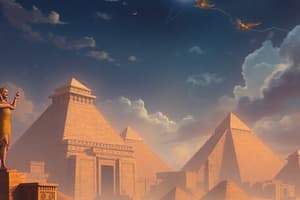Podcast
Questions and Answers
What does cultural history primarily examine?
What does cultural history primarily examine?
- The technological advancements and their societal implications.
- The financial systems and their impact on society.
- The development and evolution of culture across time and geography. (correct)
- The political history of nations and empires.
Which of the following is NOT a primary source used in cultural history research?
Which of the following is NOT a primary source used in cultural history research?
- Historical documents
- Scholarly articles (correct)
- Letters
- Diaries
How does cultural history contribute to understanding modern societies?
How does cultural history contribute to understanding modern societies?
- By revealing the lasting impact of past civilizations on contemporary cultures. (correct)
- By focusing only on social structures in recent history.
- By exclusively studying technological developments.
- By identifying the political frameworks of ancient civilizations.
In cultural history, which aspect is linked with understanding social values?
In cultural history, which aspect is linked with understanding social values?
What role do oral histories play in cultural history?
What role do oral histories play in cultural history?
Which of the following best describes the relationship between ancient civilizations and modern history?
Which of the following best describes the relationship between ancient civilizations and modern history?
Which type of evidence is valuable for understanding class inequalities in cultural history?
Which type of evidence is valuable for understanding class inequalities in cultural history?
What is one of the methodologies used in cultural history?
What is one of the methodologies used in cultural history?
What aspect does cultural history explore in relation to technology?
What aspect does cultural history explore in relation to technology?
Which element of cultural history helps to recognize continuities and changes over time?
Which element of cultural history helps to recognize continuities and changes over time?
What primary factor allowed for the emergence of settled communities in ancient civilizations?
What primary factor allowed for the emergence of settled communities in ancient civilizations?
Which ancient civilization is known for the construction of the Great Wall?
Which ancient civilization is known for the construction of the Great Wall?
Which political ideology emerged during modern history as a response to capitalism?
Which political ideology emerged during modern history as a response to capitalism?
Which event is considered a significant turning point in modern history due to its impact on global power dynamics?
Which event is considered a significant turning point in modern history due to its impact on global power dynamics?
What common feature characterized the governance structures of ancient civilizations?
What common feature characterized the governance structures of ancient civilizations?
Which of the following achievements is attributed to the ancient Egyptians?
Which of the following achievements is attributed to the ancient Egyptians?
Which of the following was a key aspect of the Enlightenment during modern history?
Which of the following was a key aspect of the Enlightenment during modern history?
Which ancient civilization is recognized for developing one of the earliest writing systems?
Which ancient civilization is recognized for developing one of the earliest writing systems?
What major global conflict spurred significant cooperation among nations to prevent future wars?
What major global conflict spurred significant cooperation among nations to prevent future wars?
Which factor contributed to the rise of nationalism in modern history?
Which factor contributed to the rise of nationalism in modern history?
Flashcards
Ancient Civilizations
Ancient Civilizations
Early societies that independently developed in different parts of the world, sharing common traits despite isolation.
Agriculture's impact
Agriculture's impact
Led to settled communities and food surpluses in early civilizations.
Social Hierarchies
Social Hierarchies
Structures in early civilizations with rulers, priests, and common people.
Modern History
Modern History
Signup and view all the flashcards
Nation-States
Nation-States
Signup and view all the flashcards
Scientific Revolution
Scientific Revolution
Signup and view all the flashcards
Industrial Revolution's effect
Industrial Revolution's effect
Signup and view all the flashcards
World Wars
World Wars
Signup and view all the flashcards
American/French Revolutions
American/French Revolutions
Signup and view all the flashcards
Cold War impact
Cold War impact
Signup and view all the flashcards
Cultural History
Cultural History
Signup and view all the flashcards
Primary Sources
Primary Sources
Signup and view all the flashcards
Secondary Sources
Secondary Sources
Signup and view all the flashcards
Archaeological Finds
Archaeological Finds
Signup and view all the flashcards
Oral Histories
Oral Histories
Signup and view all the flashcards
Impact of Ancient Civilizations
Impact of Ancient Civilizations
Signup and view all the flashcards
Continuities and Changes
Continuities and Changes
Signup and view all the flashcards
Connections Between Periods
Connections Between Periods
Signup and view all the flashcards
Cultural Evolution
Cultural Evolution
Signup and view all the flashcards
Insights into the Present
Insights into the Present
Signup and view all the flashcards
Study Notes
Ancient Civilizations
- Ancient civilizations emerged independently in various parts of the world, demonstrating common patterns of development despite geographic isolation. Examples include Mesopotamia, Egypt, the Indus Valley, China, and the Olmec civilization.
- Characteristics often associated with these early civilizations include:
- Development of agriculture, allowing settled communities and surplus food production.
- Emergence of social hierarchies, with rulers, priests, and commoners.
- Creation of complex political structures, laws, and governance systems.
- Development of writing systems, facilitating record-keeping and communication.
- Advancement in architecture, engineering, and art forms.
- Key examples of ancient achievements include:
- The pyramids of Egypt, showcasing advanced engineering and societal organization.
- The Hanging Gardens of Babylon, reflecting the technological prowess of the time.
- The Great Wall of China, signifying the power and resourcefulness of the empire.
Modern History
- Modern history encompasses the period from roughly the 15th century to the present day, marked by significant transformations in various fields.
- Key characteristics of the modern period include:
- The rise of nation-states and nationalism, leading to global conflict and cooperation.
- The Scientific Revolution and the Enlightenment, fostering new ways of understanding the world, challenging traditional authorities and emphasizing reason.
- The Industrial Revolution, dramatically transforming production methods and societal structures.
- The rise of global interconnectedness through trade, technology, and migration.
- The evolution of political ideologies, including liberalism, socialism, and communism, shaping modern conflicts and movements.
- The two World Wars and subsequent Cold War, defining the 20th century and impacting global power dynamics.
- Major events in modern history include:
- The American and French Revolutions, demonstrating the desire for self-determination and challenging traditional authority.
- The Industrial Revolution, leading to unprecedented economic growth and social change.
- The two World Wars and the Holocaust, creating immense human suffering and prompting global cooperation to prevent future conflicts.
- The Cold War, a period of geopolitical tension between the US and the USSR, shaping global alliances and influencing international affairs.
Cultural History
- Cultural history examines the development and evolution of culture across time and geography.
- It explores different facets of human experience, including:
- Arts and architecture, reflecting social values and beliefs.
- Religion and spirituality, providing frameworks for understanding the world and human existence.
- Technology and innovation, shaping daily life, societal structures, and human relationships.
- Social structures and class inequalities, impacting human interactions and opportunities.
- Cultural history relies on diverse sources of evidence and methodologies, including:
- Primary sources, such as diaries, letters, and historical documents.
- Secondary sources, such as scholarly articles and books.
- Archaeological finds and artifacts, providing glimpses into past civilizations and cultures.
- Oral histories and personal narratives, offering first-hand accounts of diverse experiences.
- Cultural history helps understand the complex interplay between different cultures and historical contexts, providing insights into the evolution of values, beliefs, and practices.
Connections Between Periods
- The study of ancient civilizations provides a foundation for understanding the development of later societies and cultures that evolved from them.
- Modern history often builds on patterns and ideas established in earlier historical periods.
- Cultural history offers an avenue to understand the lasting impact of past civilizations on contemporary societies and cultures.
- Studying different historical periods facilitates recognition of continuities and changes in human societies across time.
Studying That Suits You
Use AI to generate personalized quizzes and flashcards to suit your learning preferences.




